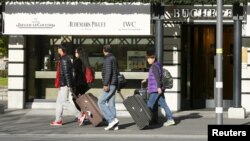Europe's travel industry could lose over $1 billion in revenues because of the impact of the Paris attacks, analysts say, though low oil prices and a recovering economy will offset security worries for the best-placed companies.
Keen to benefit from the positive factors, investors are focusing on groups that offer a wide range of destinations, can avoid places where safety is in doubt, and have robust enough finances to absorb potential shocks.
"Big companies may be better prepared because they have more ... and further destinations that will be tempering the losses," said Ipek Ozkardeskaya, market analyst at London Capital Group.
The full impact of the Nov. 13 attacks that killed 130 people in Paris will become clearer with fourth-quarter results, but there is already evidence of a significant hit to Europe's tourism industry, worth $500 billion according to the U.N.'s World Tourism Organization.
Hotel revenues in Paris are down 30-40 percent from last year's levels, restaurant revenues have fallen by a similar margin while new flight bookings to Paris fell by 27 percent in the week following the attacks.
That cost Air France KLM 50 million euros ($55 million), while British bus and train operator Stagecoach last week issued a profit warning because of customer fears about trips to big cities.
"I suspect that we're going to see a little bit more of a lingering impact for the travel industry," said Ken Odeluga, market analyst at City Index.
Analysts who spoke to Reuters gave estimates of the total revenue hit on Europe's travel and tourism sectors from the Paris attacks ranging from 800 million euros to well over 1 billion euros.
With the political and security situation still volatile in many parts of the Middle East and major Western countries on high alert for further Islamist attacks, safety fears will continue to hang over the sector for the foreseeable future.
"It can get worse when, instead of having one event, you are starting to have a series of events, because people then feel very insecure," said Daniele Patti, senior research analyst at Allianz Global Investors.
On the positive side, analysts cited tour operator TUI, cruise operator Carnival, online holiday retailer On The Beach Group, Ryanair and British
Airways parent IAG as being able to weather the storm. TUI, the world's largest tour operator, said on Thursday it was confident of increasing earnings by more than 10 percent this year, as it switched out of Egypt and Tunisia to focus on the Canary Islands and Cyprus instead.
With ships seen as less likely to be targeted in attacks, Carnival was cited as a good bet in the current context, while On The Beach Group could benefit from its focus on destinations like Spain, Portugal and the Canaries.
Airlines are also attractive as they are trading at a discount to the market, with Ryanair and IAG's price-to-earnings ratios at 13 and 11.5 respectively, compared with an average of 16.6 on the STOXX Europe 600 index and 16.4 on the UK FTSE 100 index.
Oil is a key factor for airlines, with analysts estimating that a dollar drop in the oil price added between 10 and 15 pence (15 to 23 cents) to their share prices last year.
($1 = 0.9129 euros)
($1 = 0.6592 pounds)





